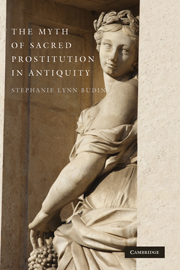Book contents
- Frontmatter
- Contents
- Acknowledgments
- Abbreviations
- THE MYTH OF SACRED PROSTITUTION IN ANTIQUITY
- 1 Introduction
- 2 The Ancient Near Eastern Data
- 3 The So-Called “Evidence”
- 4 Herodotos
- 5 In the Footsteps of Herodotos: Lucian and “Jeremiah”
- 6 Pindar Fragment 122
- 7 Strabo, Confused and Misunderstood
- 8 Klearkhos, Justinus, and Valerius Maximus
- 9 Archaeological “Evidence” from Italy
- 10 The Early Christian Rhetoric
- 11 Last Myths
- Bibliography
- Index
- Index Locorum
6 - Pindar Fragment 122
Published online by Cambridge University Press: 18 August 2009
- Frontmatter
- Contents
- Acknowledgments
- Abbreviations
- THE MYTH OF SACRED PROSTITUTION IN ANTIQUITY
- 1 Introduction
- 2 The Ancient Near Eastern Data
- 3 The So-Called “Evidence”
- 4 Herodotos
- 5 In the Footsteps of Herodotos: Lucian and “Jeremiah”
- 6 Pindar Fragment 122
- 7 Strabo, Confused and Misunderstood
- 8 Klearkhos, Justinus, and Valerius Maximus
- 9 Archaeological “Evidence” from Italy
- 10 The Early Christian Rhetoric
- 11 Last Myths
- Bibliography
- Index
- Index Locorum
Summary
Young women visited by many, attendants
of Persuasion in wealthy Corinth,
who burn the fresh, amber drops of frankincense
often fluttering in thought to the mother of loves,
Ouranian Aphrodite.
To you without blame she granted,
O children, on lovely beds
to have plucked the fruit of soft youth.
With necessity all is lovely
…
But I wonder what the masters of the Isthmos will say of me
finding such a beginning to a honey-minded skolion
a companion to shared women.
We reveal gold by a pure touchstone.
…
O Mistress of Cyprus, here to your grove
the hundred-limbed herd of grazing girls
Xenophon brought, delighting in his prayers fulfilled.
πολύξεναι νεάνιδες ἀμϕίπολοι
Πειθοῦς ἐν ἀϕνειῷ Κορίνθῳ,
αἵ τε τὰς χλωρᾶς λιβάνου ξανθὰ δάκρη
θυμιᾶτε, πολλάκι ματέρ´ Ἐρώτων
οὐρανίαν πτάμεναι
νόημα ποττὰν Ἀϕροδίταν·
ὑμῖν ἄνευθεν ἐπαγορίας ἔπορεν,
ὦ παῖδες, ἐρατειναῖς ἐν εὐναῖς
μαλθακᾶς ὥρας ἀπὸ καρπὸν δρέπεσθαι.
σὺν δ´ ἀνάγκᾳ πᾶν καλόν.
…
ἀλλὰ θαυμάζω τί με λεξοῦντι Ἰσθμοῦ
δεσπόται τοιάνδε μελίϕρονος ἀρχὰν εὑρόμενον σκολίου,
ξυνάορον ξυναῖς γυναιξί.
ἐδιδἐάξαμεν χρυσὸν καθαρᾷ βασσάνῳ.
…
ὦ Κύπρου δέσποινα, τεὸν δεῦτ´ ἐς ἄλσος
ϕορβάδων κορᾶν ἀγέλαν ἑκατόγγυιον Ξενοϕῶν τελέαις
ἐπήγαγ´ εὐΧωλαῖς ἰανθείς.
Such is the order of the lines of poetry in pindar's skolion, although Athenaios places the last verse first in his Deipnosophistai. The third century ce Alexandrian author introduces this fragment with the following explanation:
Even private citizens vow to the goddess that, if those things for which they make petition are fulfilled, they will even bring courtesans to Aphrodite. […]
- Type
- Chapter
- Information
- The Myth of Sacred Prostitution in Antiquity , pp. 112 - 152Publisher: Cambridge University PressPrint publication year: 2008

